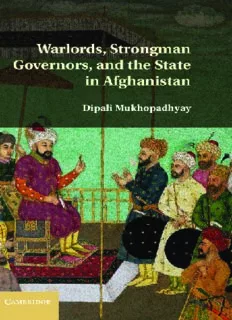
Warlords, Strongman Governors, and the State in Afghanistan PDF
Preview Warlords, Strongman Governors, and the State in Afghanistan
WARLORDS, STRONGMAN GOVERNORS, AND THE STATE IN AFGHANISTAN Warlords have come to represent enemies of peace, security, and “good governance” in the collective intellectual imagination. In this book, Dipali Mukhopadhyay asserts that, in fact, not all warlords are created equal. Under certain conditions, some of these much maligned actors are both able and willing to become effective governors on behalf of the state. This provocativeargumentisbasedonextensivefieldworkinAfghanistan,where Mukhopadhyay examined warlord governors who have served as valuable exponents of the Karzai regime in its struggle to assert control over key segments of the countryside. She explores the complex ecosystems that came to constitute provincial political life after 2001 and goes on to expose the rise of “strongman” governance in two important Afghan provinces. Although this brand of governance falls far short of international expect- ations,itsemergencereflectsthereassertionoftheAfghanstateinmaterial andsymbolictermsthatdeserveourattention.Thisbookpushespastcanon- ical views of warlordism and state-building to consider the logic of the weak state as it has arisen in challenging, conflict-ridden societies such as Afghanistan. DipaliMukhopadhyayisanassistantprofessorintheSchoolofInternational and Public Affairs at Columbia University and a member of the Arnold A. Saltzman Institute of War and Peace Studies. She has been conducting research in Afghanistan since 2007 and made her first trip to the country in2004. Warlords, Strongman Governors, and the State in Afghanistan Dipali Mukhopadhyay ColumbiaUniversity 32AvenueoftheAmericas,NewYork,NY10013-2473,USA CambridgeUniversityPressispartoftheUniversityofCambridge. ItfurtherstheUniversity’smissionbydisseminatingknowledgeinthepursuitof education,learning,andresearchatthehighestinternationallevelsofexcellence. www.cambridge.org Informationonthistitle:www.cambridge.org/9781107023925 ©DipaliMukhopadhyay2014 Thispublicationisincopyright.Subjecttostatutoryexception andtotheprovisionsofrelevantcollectivelicensingagreements, noreproductionofanypartmaytakeplacewithoutthewritten permissionofCambridgeUniversityPress. Firstpublished2014 PrintedintheUnitedStatesofAmerica AcatalogrecordforthispublicationisavailablefromtheBritishLibrary. LibraryofCongressCataloginginPublicationData Mukhopadhyay,Dipali. Warlords,strongmangovernors,andthestateinAfghanistan/DipaliMukhopadhyay. pages cm Includesbibliographicalreferences. ISBN978-1-107-02392-5(hardback) 1. Governors–Afghanistan–Biography. 2. Warlordism–Afghanistan– History. 3. Afghanistan–Politicsandgovernment–2001– 4. Politicalculture– Afghanistan. 5. Afghanistan–Biography. I. Title. DS371.42M85 2014 320.9581–dc23 2013029440 ISBN978-1-107-02392-5Hardback CambridgeUniversityPresshasnoresponsibilityforthepersistenceoraccuracyof URLsforexternalorthird-partyInternetWebsitesreferredtointhispublication anddoesnotguaranteethatanycontentonsuchWebsitesis,orwillremain, accurateorappropriate. Thisbookisdedicatedtomyhusband,KishoreKuchibhotla,andmy latefather,NimaiC.Mukhopadhyay. Contents Acknowledgments pageix 1 BuildingaTheoryofStrongmanGovernanceinAfghanistan 1 2 AttaMohammadNoor,theSonofBalkh 76 3 GulAghaSherzai,theNeo-KhanofNangarhar 166 4 IsmailKhan,theEmirofHerat,andJumaKhanHamdard, theWanderingWali 243 Conclusion 316 Appendix:MapandProvincialSecurityMetrics 363 Index 371 vii
Description: